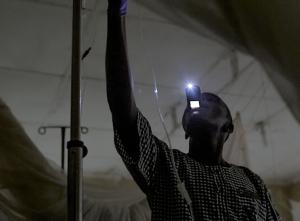Liberians cope from civil war fallout.
Marilyn Smith is Executive Director of EnAct.

Joseph Mayah recalls the night rebel forces first attacked the Bushrod Island Power Plant on the outskirts of Monrovia, a city of one million, about twenty-five per cent of the Liberian population. “You hire security guards to protect your assets, but when bullets fly, you have to accept that they will run for their lives.”
The domino effect followed quickly, spreading to both demand and supply sides of the electricity system. The city’s water and sewage systems ground to a halt; hospitals and schools were forced to close. People were left with two choices: hide in the dark or flee an increasingly dangerous city. With generation capacity knocked out, water pressure eventually burst the Mt. Coffee hydro dam.
In late 2015, EnAct travelled to Liberia to shoot Darkness, a documentary film exploring how the aftermath of forced energy poverty affects young people today. Immediately striking was how much human potential the country had lost.

